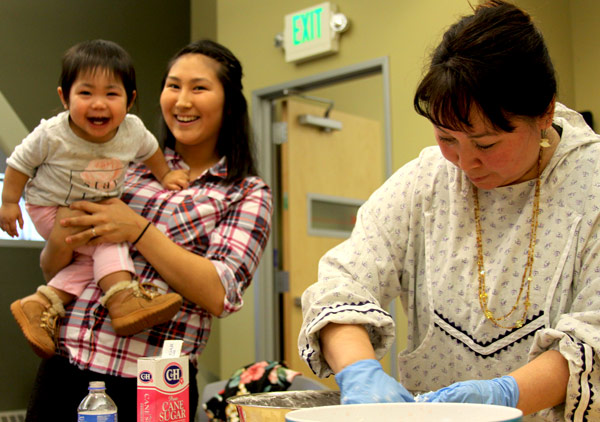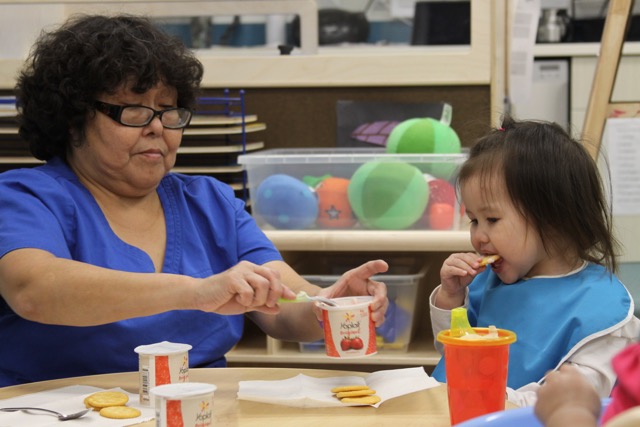Clare Swan Early Head Start Launches Anchorage’s First Early Childhood Yup’ik Immersion Language Class
By Jamey Bradbury, courtesy of Cook Inlet Tribal Council

It’s snack time for the toddlers in Grace White and Rose Savok’s classroom. As the two Clare Swan Early Head Start teachers help their young students wash their hands, they describe what they’re doing to help the children learn language.
The catch? They’re speaking Yup’ik.
Cook Inlet Tribal Council’s (CITC) Clare Swan Early Head Start, which opened its doors in March 2017, is offering Anchorage’s first early childhood Yup’ik immersion classroom, where children as young as 6 months begin to learn Yup’ik, one of Alaska’s 11 Native languages. While many rural communities have offered Yup’ik and other Native language immersion classes, this is the first time such a class has been made available in Alaska’s largest city.
“In Anchorage, you’ve got students learning Spanish, Japanese, German, Russian—but there was never an Alaska language taught here,” said Isailgaq “Isty” Hlasny, the Yup’ik language coordinator for Clare Swan Early Head Start. “To bring Yup’ik to the Anchorage area, it’s not just about education; it also reconnects families with tradition and cultural activities.”
This groundbreaking opportunity was made possible through an Esther Martinez Immersion grant awarded by the Administration for Native Americans. CITC partnered with Cook Inlet Native Head Start (CINHS) to bring Native language immersion to 28 children from birth to age 5. Any child enrolled at Clare Swan may participate in the Yup’ik immersion class, which offers eight slots; meanwhile, CINHS holds classes for children ages 3 to 5. With the Anchorage School District having just been awarded a federal language grant for teaching Yup’ik, said Isty, children will have the opportunity to keep learning and speaking Yup’ik well beyond their head-start years.
“It’s the opposite of our history, when we lost our languages because our people were sent to English-speaking schools,” she points out. “Hearing from Elders who had to get education outside their villages, in schools where speaking their Native language was forbidden—we’ve lost so many of our languages, others are dying off. But Yup’ik is still strong, and we want to keep it that way. So to have this, it’s very important.”

Early Head Start launched Anchorage’s first early childhood Yup’ik immersion classroom. Photo by Jamey Bradbury.
In Grace and Rose’s classroom, children learn through all the usual activities toddlers do in head start: play with toys, learn to pick up after themselves, eat snacks, go outside. But the whole time, the teachers, both of whom are fluent in Yup’ik, speak to the children in Yup’ik only.
Research supports starting a second language early on, since young children are better at mimicking new sounds and adopting proper pronunciation than older learners. Early second language acquisition is also beneficial for little ones: studies have shown that it improves critical thinking skills, creativity and mental flexibility.
And when it comes to learning Yup’ik, the benefits go beyond the classroom.
“We want our daughter to know every culture she comes from,” said Arlene Alexie, whose daughter Melaena is enrolled in the immersion class. In November, Arlene and her family attended their first Yugtun Night, a monthly activity for families of students in the Clare Swan Yup’ik immersion class that allows parents to learn along with their children.
At this session, Isty demonstrated her own family’s method of making agutuk (Eskimo ice cream) as Arlene’s daughter watched with interest. Each gathering includes some kind of cultural activity, in addition to language practice. At a future Yugtun Night, Isty has plans to show parents how to make drums and to learn Yup’ik dancing.
“I only know the basics of Yup’ik,” Arlene continued. “I’m excited to learn more along with Melaena. It’s good for her to have this connection to her culture.”
Teachers of the Yup’ik immersion class also depend upon families to provide the Native names of the participating children, which sometimes requires tracing backward through grandparents or aunts. In class, children are referred to by their Native names.
“Families are so glad for the opportunity for their kids to be taught Yup’ik,” Isty said. “It’s been a very positive response, and I’ve gotten a lot of interest in the class.”
Any child enrolled at Clare Swan Early Head Start is eligible to enroll in the Yup’ik immersion class, which allows for up to eight children. Classes are held 9 a.m. to 4 p.m Monday through Friday, year-round. For more information, contact Nicole Hunter at nhunter@citci.org.



